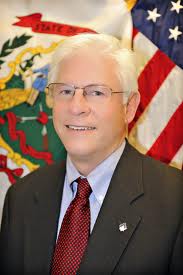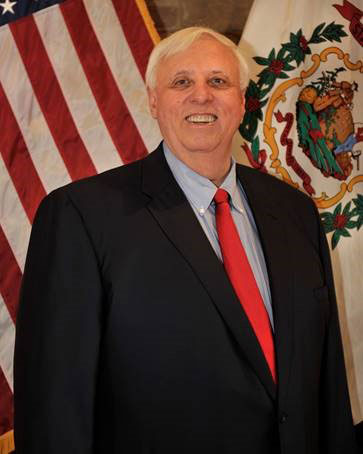Parts of Route 4 fell into the Elk River during flooding. This is what the road looked like Saturday, June 25 just outside of Clendenin. Shauna Johnson/WVMetroNews.com
By: Brad McElhinny | Posted: May 30, 2018 at 6:52 p.m. | Source: WV MetroNews
CHARLESTON, W.Va. — On Nov. 2, 2016, just a few months after devastating floods hit West Virginia, then-Commerce Secretary Keith Burdette scrawled his name across a memo urging emergency action on an agreement to help manage millions in federal disaster relief dollars.
The memo was addressed to David Tincher, who was the state Purchasing director at the time.
West Virginia was anticipating approval of federal Community Development Block Grant funds for disaster relief.
Burdette recommended swift action — both for approval and in distributing the aid to West Virginians who had lost their homes, belongings and livelihoods.

Keith Burdette
“West Virginia has never received this amount of disaster recovery funding in the past,” Burdette wrote.
“Due to the extremely short deadline, a consultant needs to be commissioned immediately to assist the West Virginia Development Office in developing a strategy on how best to effectively utilize these funds in the designated areas, as well as to set up processes to track and expend the funds sufficiently in accordance with the federal regulations and requirements.”
Burdette warned that there would be complex regulations and requirements governing the funds. The first step would be to come up with a comprehensive action plan within sixty days.
“Without the ‘action plan’ and the necessary systems and processes in place, West Virginia will have to forfeit the CDBG-DR funding,” Burdette wrote.
Tincher indeed responded quickly, the same day at 6:56 p.m via an email from his iPad.
“Please be advised that your emergency purchase request is hereby approved,” he wrote.
View Keith Burdette email and memo
The memo and response kicked off a situation that rippled into the next, incoming administration.
When the current Department of Commerce tried to renew a contract with the consultant, Horne LLC, the agreement drew scrutiny from the Governor’s Office.
Questions by the Governor’s Office — and the state Purchasing division — caused the contract to be put on pause this spring, right as West Virginia finally got federal approval to start spending the federal disaster relief funds that Burdette had described with such urgency.
MORE: Local flood relief agencies exasperated over delays; Gov kick-starts RISE
The Governor’s Office has said its aim was to be careful about the contract while continuing to provide flood relief.
Reaction from lawmakers and citizens has been confusion and concern about why the contract was halted when so much flood relief remains.
West Virginia MetroNews sought and received communications between the Department of Commerce and the Purchasing division through a Freedom of Information Act request.
They show months of interaction, starting with a Commerce request last December to re-up the contract with Horne followed by questions from Purchasing that kicked up this spring, culminating with an official halt to the contract this April 4.
They show state officials in two different agencies — both in the executive branch under Gov. Jim Justice — trying to work through the sheer amount of money involved and the intent of the contract with Horne.
They show loose ends, followed by maddening delays.
It was a bureaucratic drama, with twists and turns at every push of the send button.
The buildup
West Virginia’s needs were vast.
Thunderstorms that concentrated over West Virginia created a historic rainfall on June 23, 2016. Some counties were hit with 10 inches of rain over 24 hours.
Twenty-three people were killed. There were 1,200 homes destroyed, and thousands were without power. The flood damaged businesses, roads and water and sewer systems.
Housing repairs and replacement were estimated to exceed $300 million. Damage to West Virginia’s public infrastructure was estimated to top $500 million.
About a year after the floods, June 1, 2017, the federal Department of Housing and Urban Development approved the action plan to manage $104 million in Community Development Block Grant disaster recovery funds.
That was later augmented with an additional $45 million.
This was the first time West Virginia had received such a grant. Meanwhile, West Virginia was also managing the largest amount of FEMA Hazard Mitigation Grant Program funds ever received.
Representatives from HUD, FEMA and the Justice administration gathered on Nov. 7, 2017, for a meeting of the minds.
“Due to the complexity of the situation, the meeting was convened to ensure that there was a holistic strategy for the use of these funds,” FEMA Region III officials wrote in their newsletter, Forward Recovery.
Participants raised concerns that the federal agencies had allocated more money toward housing recovery than was really needed.
The Department of Commerce agreed to work with HUD to figure out how to reallocate housing funds once the needs had been covered.
“Overall, the participants wanted to ensure that funding decisions and recovery efforts decrease specific risks over time and make communities more resilient,” FEMA wrote in the newsletter.
Contract renewal
By December, Commerce was taking steps to renew its one-year contract with Horne.
Horne sent a memo to the state Development office Dec. 6, 2017, expressing its agreement to extend its project management services.
The Development Office wanted to do that too.
On Dec. 7, 2017, Russell Tarry of the West Virginia Community and Development Office in Commerce wrote a memo to the Purchasing division.
“The West Virginia Development Office wishes to renew the Disaster Recovery and Project Management Agreement with Horne LLP, who has agreed to renew this agreement under the same terms and conditions set forth in the original agreement, including any subsequent amendments or Task Orders,” Tarry wrote.
“The renewal period will be valid from December 12, 2017, to December 11, 2018.”
Another official notification went out Dec. 13, 2017, from Sheila Hannah, the procurement officer for the state Development Office.
“We would like to renew this contract for one year. This contract is to benefit the residence of West Virginia flood victims of June 2016.”
Sheila Hannah and Melissa Pettrey Email
A week after her memo went out, Hannah followed up with Melissa Pettrey, the senior buyer in the Purchasing department who was the original recipient. “Melissa are we waiting on something?” she wrote at 11:02 a.m. Dec. 20, 2017.
There was a sign of trouble, but it didn’t seem major.
At 12:06 p.m., Pettrey responded “The memo from you should have your signature, but I will process this as is. However, going forward, please include your signature on all memos and/or letters.
“Also, remind our agencies not to wait until the last minute to submit change orders, especially renewals.”
At 2:53 p.m. Guy Nisbet, a supervisor in the Purchasing division, responded that the request had to be rejected because of what appeared to be a technical problem. “This is Change Order No. 01 not Change Order 02.”
He concluded with a simple instruction.
“Please review and submit.”
Slow pace tag is applied, contract inquiry begins
That was the last of the email communication between Commerce and Purchasing for a few months.
At the start of this year, members of the Justice administration got together to broadly assess progress, Brian Abraham, general counsel for the administration, recalled this past Friday on MetroNews’ “Talkline.”
“The issue came up: ‘Have you started any work yet?’ And the answer we got was ‘We just did.’”
A few key events transpired early this year.
West Virginia made its request to start using federal long-term relief money on Jan. 29.
HUD gave its OK on Feb. 20.
And shortly after that, West Virginia drew notice from the federal agency for the pace of drawing down the federal funds.
By the time a performance report was put out by HUD covering this past January through March, only $1,138,866.60 had actually been spent.
“It is not uncommon for large-scale disaster relief efforts to get off to a slow start,” said Brian Sullivan, a spokesman from HUD, in an interview earlier this month. “However, if it strikes us as being slow we’ll say so. And in this case we have.”
Abraham said the slow spender designation came out during a January meeting with the state Department of Commerce and representatives from Horne.
“They indicated to us it was not a huge deal,” Abraham said last week on MetroNews’ “Talkline.” “They were working through it and because now the projects were starting that would all work out.”
About that time, Abraham said, state officials started looking at the contracts having to do with the long-term recovery money.
“What raised some suspicions was that there was a $900,000 initial contract and then we saw during this presentation the new contract was for $17 million,” he said.
The contract was worth up to $17 million over its course, although Horne had been paid only about $700,000 over the past two fiscal years.
The situation gave the administration pause, Abraham said, because of the amount of money and what it saw as a lack of controls in place.
“That immediately raised some red flags, and we started looking into it,” he said.
The law firm for U.S. Attorney Mike Carey was paid more than $20,000 in April to look into the matter. And the eyes on the contract extended beyond that.
“I personally took five bankers boxes worth of records to the legislative auditor’s, who put three or four people on it. They pointed out things to us,” Abraham said.
“We had to arrange a meeting with Mike Stuart, the U.S. attorney. Mike Carey and I went down and provided that to him. We then had various meetings with members of the Legislature where we told them what we going on. Then we tried to organize a meeting with HUD leadership.”
Spring swirl
As the administration embarked on its examination, the messages between Commerce and Purchasing kicked up.
The first hint of trouble was 11:09 a.m. March 2.
Sheila Hannah, the procurement officer with the Development Office, zipped an email to Nisbet and Pettrey.
“Guy/Melissa, Have you had a chance to look over the task orders I brought over for you to look at yet? I have had several inquiries about them. Thanks.”
Yes, there were questions.
Nisbet responded at 1:40 p.m. that day that he had seven of them.
- What is Horne requesting and you the Agency agreeing to
- What justification is there to support any additional changes
- What has transpired since the award of the contract that moves the vendor to provide service/work outside what was captured during the award.
- Who ok’d the work and based on what criteria
- The responses to these items must be in detail and reference the part of the original contract that has changed while connecting to the documentation and clarification of the documents that you presented.
- This is a really quick review and provided responses most likely will develop additional questions depending upon the responses and clarity
- This was awarded as a fixed contract with renewals, therefore any additional funds spent will require an additional commodity line within Oasis so that encumbrance is possible.
Nisbet concluded, “Again this is a starting point of questions and will require further review once we are able to review the above responses.”
Within 20 minutes, the Nisbet email was circulating around the Development Office with everyone trying to figure out who should answer the questions.
The first take appeared to land with Russell Tarry of the West Virginia Community and Development Office. He wrote at 2:34 p.m. that day that he’d tried to provide his best immediate explanation.
“I provided the explanation below in red,” he wrote. “I think they will have more questions, so please let me know what other information I can provide. We may want to include Josh at some point as well.”
The Josh he referenced was Josh Jarrell, the general counsel for Commerce who had signed the contracts with Horne.
Jarrell wound up parting ways with Commerce. The Justice administration has said he was fired. Jarrell says he was nudged and left of his own accord.
“State procurement is a detailed and technical process,” Jarrell toldthe Charleston Gazette-Mail this month.
“If any errors were made, they were minor compared to community needs and occurred in haste to bring nearly $150 million in congressionally appropriated federal aid to West Virginia after a major flooding disaster that left many homeless and claimed many lives.”
Inquiry continues
Through March, the back-and-forth continued between Commerce and Purchasing.
At 10 a.m. March 7, Hannah of Commerce wondered where matters stood.
“I see I got left out of an email about Horne. Did they answer your questions, or do I need to do something? This place is a very unique place.”
Turns out she had been left off the email chain with the responses by Tarry from a week earlier.
One by one, Tarry had briefly answered Purchasing’s questions.
Once Hannah got the answers, she forwarded them on to Purchasing.
“Here is part of what they had done,” Hannah wrote. “I told them it was in-depth enough.”
By 12:29 p.m. Nisbet sent back a note indicating he didn’t find the answers sufficient.
“The responses are not in depth enough nor are they captured so that it is understood, this was just a road map to help you develop responses that can be evaluated,” he wrote. “I do not see the Change Order in wvOasis and I do not see the requested documentation.”
He passed back the original questions, Tarry’s responses and his own followup questions and comments in bold type.
Guy Nisbet and Melissa Pettrey Email Page 12
Guy Nisbet and Melissa Pettrey Email Page 13
That’s where matters stood until a couple of days later, March 9, when Administration Secretary John Myers sent an email to Purchasing Director Mike Sheets and James Meadows, general counsel for Purchasing.
“You should have received a calendar entry for Monday at 1:00 for a meeting with commerce,” Myers wrote.
“This is in reference to a $146 million contract with Horne Associates. I understand they have something to do with flood relief. I wanted to give you the opportunity to prepare as I know nothing about the contract or their concerns.”
Sheets forwarded the email, asking his assistant director Frank Whittaker about the status of the change order.
Whittaker provided the current status, along with some additional narration.
“Guy and Melissa went back to Sheila with questions concerning the intent of the change request. To date Sheila has not submitted anything through Oasis,” he wrote.
And in apparent reference to general counsel Meadows, he added, “Jimmy is looking at the file now. Jimmy is concerned that it looks like we are being unhelpful.”
From his Samsung Galaxy Tab S2, Sheets wrote back, simply, “Thanks.”
Finale
No action for the next couple of weeks.
Then, on March 19, Kimberly Miller of the Development Office sent an email to a list of recipients that included Pettrey and Sheets of Purchasing.
Miller wrote that the $900,000 contract for Horne “was never done correctly on our end.”
She wrote, “It should not have been capped at $900,000, which was just the first two task orders of many task orders. Is it absolutely necessary to have a letter from Horne when they are not asking for anything beyond what their original bid was?
“We know of additional task orders 3 through 8 at this point and there could be more, but those are within the scope of the original RFP and the original bid of 17% of the original federal award. Shouldn’t Horne’s signature on the task orders be sufficient? Again, they are not asking for anything outside of the scope or bid of the original response to the RFP.
“We understand that you need a letter from us and perhaps it should also explain that due to an error on our part this CCT was capped at $900,000 when it never should have been.”
More time passed.
At 11:31 a.m. March 27, Pettrey of Commerce tried to prompt a response. She wrote to Pettrey of Purchasing.
“Melissa, This was sent the 19th and we still do not have a response.”
Pettrey wrote back at 1:53 p.m.: “Sheila, See Director Sheets comment below.”
Sheets, director of Purchasing, had been looped in. Pettrey was passing on his brief assessment of the situation.
“The Horne contract is under review by the Governor’s Office,” Sheets had written at 1:50 p.m. “We have been asked not to take any action until their review is complete.”
That was a month and a week after Housing and Urban Development had sent its official letter of approval for the funds to be spent.
Melissa Pettrey Email Page 6
Another week passed, and on April 4 Sheets sent out a memo with the final ruling.
It answered the question about the change order that had first been floated in early December of 2017.
Over the four pages of his memo, Sheets spelled out the history of the contract, starting with the emergency approval that had been sought by Burdette in late 2016.
He also described concerns.
Work already completed cannot be added after the fact by a change order, he wrote. And the pricing and scope of the work for the third phase was not sufficiently defined to allow it to continue under the existing contract.
He concluded that West Virginia would be best served by competitive bidding to get the best pricing and value for the services that had better defined over the course of the back-and-forth between Commerce and Purchasing.
“For the reasons stated herein, the Purchasing Division will not approve the change order containing Task Orders 3 through 8 if it is submitted,” Sheets wrote. “The Purchasing Division will, however, work diligently with the WV Development Office to quickly obtain any needed services through proper procurement methods.”
Horne LLP – Contract Change Order by Sheila Hannah
Epilogue
The public became aware of the problems with long-term disaster relief on May 17 when WCHS-TV reported on complaints from flood victims who described red tape.
The first time the Justice administration publicly described its concerns with the contract was an interview with WSAZ-TV on May 22.
“There’s a new sheriff in town and people need to realize that Jim Justice will see to it that West Virginia is not going to be on the short end of the stick,” Governor Justice stated in that account..
“We found things that could save West Virginia millions in federal funding. Our flood victims are going to continue to be served. Those people that weren’t doing their jobs have been held accountable.”
In an interview with the West Virginia Press Association on May 23, general counsel Abraham alluded to the possibility that Horne’s services could be reinstituted.
And in a telephone interview with The State Journal today, Governor Justice said long-term flood relief is getting up and going.
Justice told the newspaper that the pause on the contract was lifted last Monday.

Governor Jim Justice
“If I had known, really, that the pause had delayed monies going to somebody, I’d have been all over that the very second I heard that, just because of how I feel,” Justice said.
And by this evening, the governor’s account tweeted that the lingering problems had been resolved.
He said six flood victims have now gotten the keys to brand new homes.
“Along the way I uncovered waste and abuse and stopped the state from losing $8 million that can be used to help our flood victims,” Justice stated.
“Moving forward my office will continue working closely with the Department of Commerce and every day we are monitoring this program to ensure we are serving the West Virginia families who were affected by this disaster and still need assistance.”
 Brad McElhinny is the statewide correspondent for MetroNews. Brad is a Parkersburg native who spent more than 20 years at the Charleston Daily Mail.Contact him at brad.mcelhinny@wvmetronews.com or on Twitter @BradMcElhinny.
Brad McElhinny is the statewide correspondent for MetroNews. Brad is a Parkersburg native who spent more than 20 years at the Charleston Daily Mail.Contact him at brad.mcelhinny@wvmetronews.com or on Twitter @BradMcElhinny.













